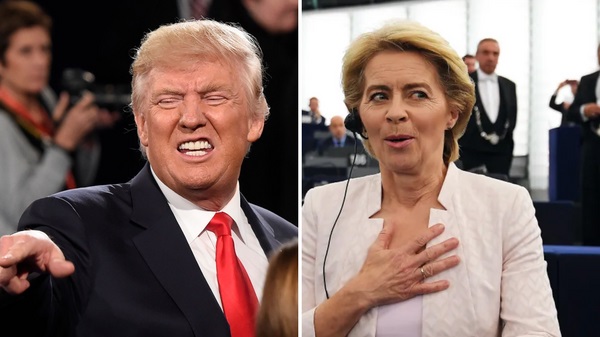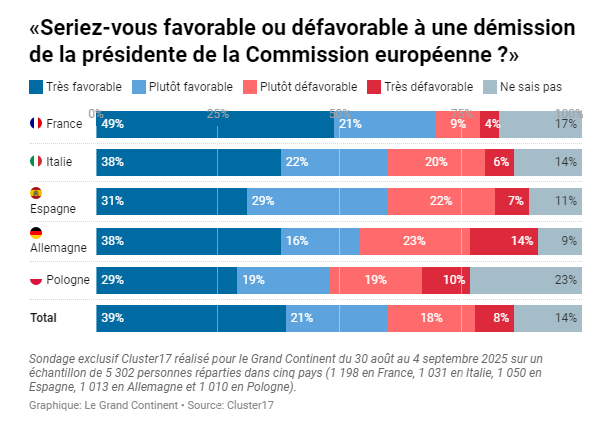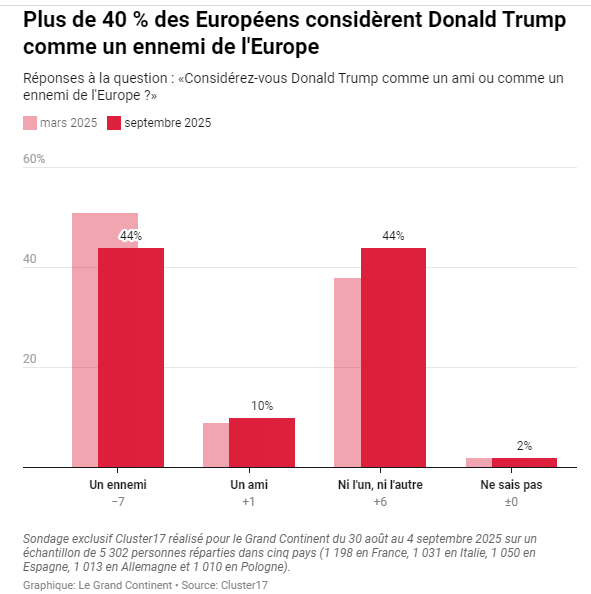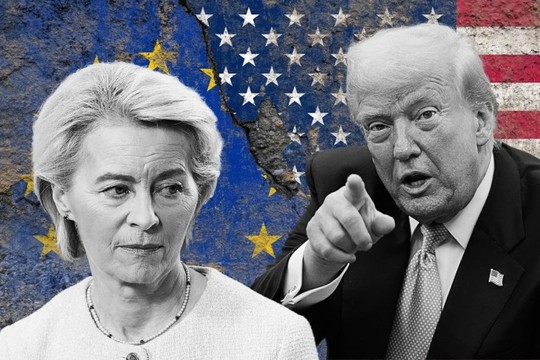Pic.: Asia Times
After eight months of Trump and a summer marked by the Turnberry trade deal, what is the state of the Union?
Our latest Eurobazooka survey with Cluster 17 reveals an underlying trend: European public opinion seems to be formulating a demand that is not being met by a supply, ’Le Grand Continent’ (France) writes.
Donald Trump has helped politicize a trade agreement beyond all expectations: despite the summer break and the technical nature of the negotiations, 71% of those surveyed say they have "heard about the agreement" and know "what it is about."
A clear majority of respondents at the European level said they felt "humiliated" upon learning of the agreement (52%). This figure is particularly high in France (65%) and Spain (56%), but remains consistent — showing the existence of public opinion on the subject.
A majority of 77% believe that the agreement will mainly benefit the American economy, while 42% believe that European companies will be most affected.
On the eve of her State of the Union address, the actions of the President of the Commission are being very harshly judged: 75% of respondents believe that she has poorly defended European interests.
A majority of Europeans (60%) – including Germans (54%) – want the resignation of Commission President Ursula von der Leyen.
A significant majority of respondents (70%) say they want to remain in the European Union.
A substantial proportion of respondents indicated that they preferred "opposition to the US government" (39%) to "compromise" and "alignment" - marking an unprecedented gap between political supply and demand in Europe.
A very large majority of Europeans (76%) oppose the implementation of the agreement regarding investments of 600 billion and energy purchases of 750 billion and say they are ready to boycott American products (70%).
‘Le Grand Continent’ and ‘Cluster 17’ surveyed citizens from five countries representing six out of ten Europeans: France, Italy, Spain, Germany and Poland 1.
 Photo: publics
Photo: publics
Europeans perceive an overwhelming responsibility on the part of the European Commission and its president
For a large majority of Europeans (61%), the main responsibility for the customs agreement is the European Commission. Despite the heavy responsibility of several of them, the Member States come far behind (28%).
This attribution of responsibility is particularly strong in three of the five countries surveyed: 70% of Spaniards, 66% of Germans, and 64% of French people point directly at the Commission. In Italy, it is also the majority (55%). Only Poland is an exception, with a more diffuse division between the Commission (43%), the Member States (27%), and the European Parliament (23%).
Beyond the figures, this reading has far-reaching consequences: Europeans clearly identify the Commission — and, implicitly, its president — as responsible for an agreement perceived as humiliating. This judgment reinforces the political personalization of the sequence — most likely produced by the staging of the agreement's announcement at Turnberry — and fuels the strong distrust of the Commission president that runs throughout the investigation.
When asked about the Commission President's actions in the summer negotiations, Europeans were extremely harsh. Even though the question recalled Donald Trump's threat to impose 30% tariffs, Ursula von der Leyen was judged by 75% of respondents to have "poorly defended" European interests, including 38% who believed she had "very poorly defended" them — a sign of condemnation of an intensity that appears unprecedented.
This rejection is widespread across almost the entire continent. It reaches 87% in France, 78% in Spain, and 75% in Germany. In Italy, 72% share this negative assessment. Only Poland stands out, with 48% critical, more positive opinions (36%), and a greater number of undecided (16%).
Overall, this verdict underscores the extent of distrust toward Ursula von der Leyen. Despite contextual elements recalling Washington's initial threats, a large majority of Europeans believe that she has failed to defend the Union in this trade standoff.
On the eve of the State of the Union address, 60% of Europeans surveyed are in favor of Ursula von der Leyen's resignation

Distrust of Ursula von der Leyen stands at 72% — 87% for France. When asked if they have confidence in the current Commission president to defend European economic interests, the majority of respondents in all five countries say no, although the result is slightly less clear-cut in Poland, where distrust is the majority, but only at 51%. In Germany, where some newspapers have reported that she could run for the federal presidency, 66% of those surveyed do not trust him.
In line with this low popularity rating and this largely negative assessment, the majority of Europeans are in favour of his resignation.
Friend, enemy, dictator…: How do Europeans perceive Trump?
In this Eurobazooka wave, 44% of Europeans consider Donald Trump an enemy of the continent, compared to only 10% who see him as a friend. An equal proportion (44%) refuses to decide and places him in a gray area, neither ally nor adversary.

This judgment of hostility remains the majority in France (51%), Spain (54%), Germany (43%) and Italy (43%).
Finally, 36% consider that he behaves like a dictator and 47% that he has authoritarian tendencies.
An unprecedented differential between political demand and supply: the problem of opposition to the American government
A significant proportion of Europeans (39%) express a clear preference for an attitude of "opposition to the American government", rather than compromise or alignment.
This orientation reflects an unprecedented gap between the expectations of public opinion and the positions generally adopted by political leaders in Europe.
The rejection of the agreement currently under discussion is massive.
More than three-quarters of respondents (76%) oppose its implementation, particularly in its most significant economic dimensions, which involve investments of 600 billion and energy purchases estimated at 750 billion.
This distrust is not limited to the declarative level: a significant majority (70%) say they are ready to take action by boycotting American products, signaling that political opposition could quickly transform into concrete mobilization in the economic and social sphere.
The results of this survey clearly show that this demand could now be met with disappointment caused by the lack of a political offer.
Europeans are overwhelmingly in favor of a solution that would promote compromise with Donald Trump's United States (50%) — rather than head-on opposition (39%) that could lead to a break.
But at the same time, the massive rejection of both the figure of Ursula von der Leyen and the European strategy shows that the Commission's efforts are not perceived as going in the direction of the expected compromise - contrary to the communication made about it.
Although they largely focus on trade negotiations as the latest European news item widely identifiable in public opinion, the results of this survey in fact confirm a broader sequence, dominated in representations by the feeling of humiliation.
They indicate that a potentially majority part of European public opinion is demanding greater resistance to the unilateral dynamics of the Trump administration and personalities who are able to better enforce Europe's respect on the international stage.
read more in our Telegram-channel https://t.me/The_International_Affairs

 11:44 12.09.2025 •
11:44 12.09.2025 •























